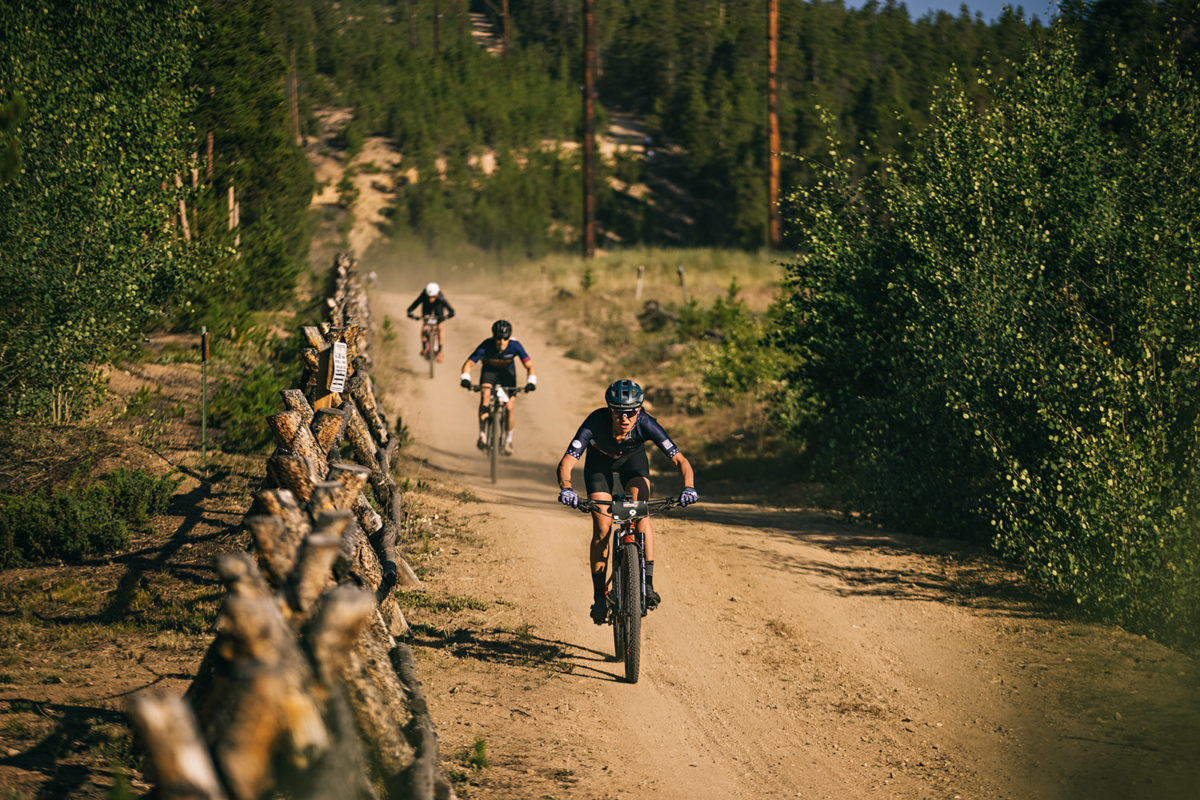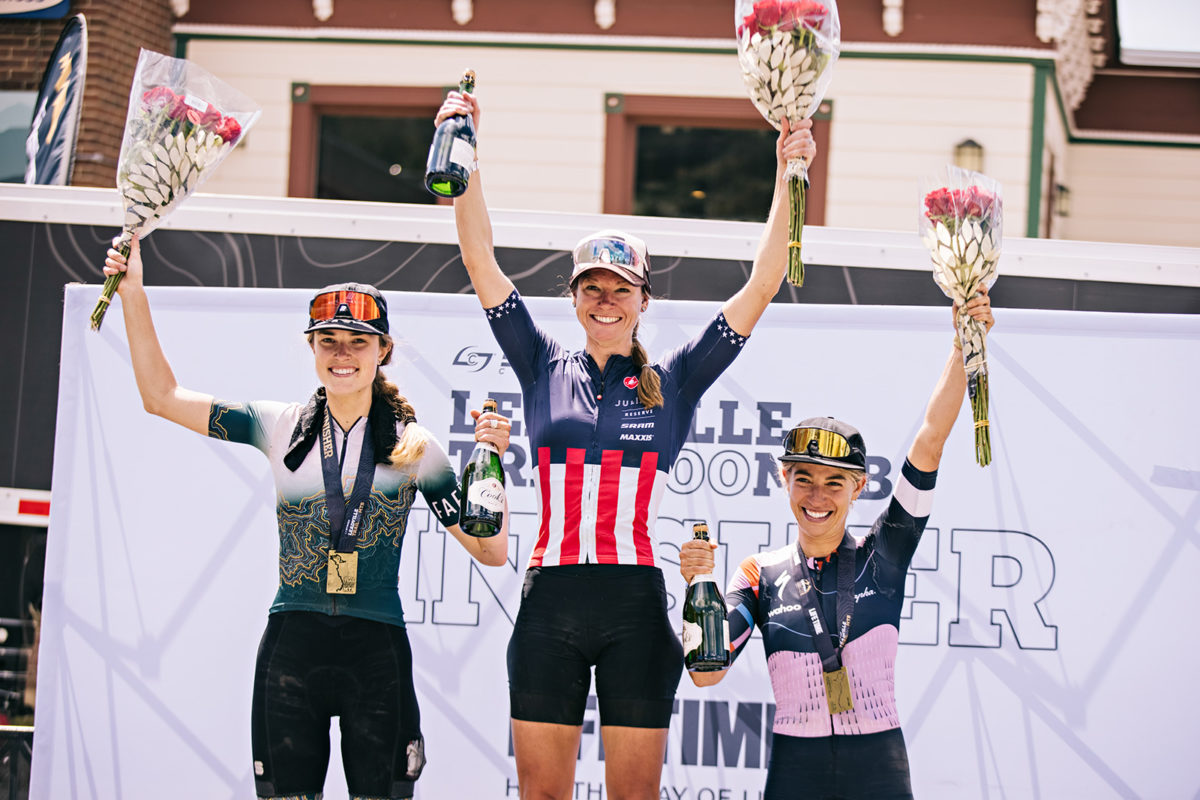Rose’s Redemption
After injuries sidelined her and forced a new perspective, Columbia Falls professional mountain biker and proud mother Rose Grant is back on top of the racing world, including a second straight title at the Leadville Trail 100 on Aug. 14
By Maggie Dresser
After five victories at the Mountain Bike Marathon National Championships starting in 2014, landing a spot on the World Champion National Team for four years and winning countless other races since she started her professional career, Rose Grant entered the Leadville Trail 100 race in Colorado for the first time in 2019 with intentions of winning.
Despite never entering a 100-mile race before, Grant won Leadville by a landslide in seven hours, 36 minutes and nine seconds, crushing the second-place competitor by 18 minutes.
“I wasn’t really surprised I won, but I was surprised I won by that much,” Grant, a Columbia Falls resident, said.
On Saturday, Aug. 14 of this year, Grant returned to Leadville as the reigning champion, after the grueling 104-mile race was canceled in 2020. She won again, this time by four-and-a-half minutes at a pace of 13.52 miles-per-hour in a deeper pool of 137 women.
“It was really cool,” Grant said. “I wanted to defend my title, but I realized Leadville isn’t typically that well-attended and I thought, ‘Just focus on your performance and execute your plan.’”
Grant arrived in Leadville a week before the race to train and acclimate herself to the elevation, which reaches more than 10,000 feet in town. The out-and-back race starts at 6:30 a.m. as the sun rises, and the bulk of the course is a double-track jeep trail through the rugged terrain of the Colorado Rockies, much of which is above tree line.
The race begins with a descent toward the first climb where the riders gradually separate, and Grant says this is where she settles into a pace. She’s completely focused throughout the ride and analyzes her every move.
“You think about, ‘What am I eating here? I need to finish this bottle before I get to the next bottle,’” Grant said. “There are sections of the course that are beneficial to drafting … All of these things are constantly going through your head, and it’s incredible how quick seven-and-a-half hours go.”
The race’s highest elevation reaches 12,516 feet at Columbine Mine, the most physically demanding 10-mile section of the trail that gains 4,000 feet in elevation among the total 12,000 feet in elevation gain throughout the race.
“By the time you start climbing Columbine, you’re over 12,000 feet,” Grant said. “You turn around and it’s two-way traffic and you have to stick to your side of the road. It’s a loose, rocky, really rugged high-alpine double track.”

Grant attributes much of her success over the past few years to a refinement in her mental space. The 38-year-old focuses on her individual effort and avoids distraction from her competitors, focusing on hydration and steady pacing during races. The combination of a set race plan, knowing her limits and a mind free of clutter has proven to be successful.
But until 2019, Grant’s mentality toward racing was drastically different. She put a lot of pressure on herself, she powered through injuries and racing was her entire identity.
Grant entered the mountain biking circuit later in life than most professionals, switching to biking after a running injury in 2010 in her late 20s. She picked up the same bike she rode in high school.
She quickly gained traction as a competitive mountain biker and within four years was a Mountain Bike Marathon National Champion. She also became a four-time World Championship National Team member starting in 2015.
But shortly after Grant became a high-profile racer, a series of injuries forced a change in perspective.
In August of 2016, Grant tore her ACL at a World Cup mountain bike race in Quebec after a crash resulted in a hyperextension. After rehab, she entered 2017 strong, only to dislocate her shoulder early in the year. In April 2018, she fractured her fibula at the Pan American Championships in South America.
After returning home to Columbia Falls that spring, she underwent surgery on her fibula, and as soon as she could walk again, she had surgery on her shoulder, which became a chronic injury.
Frustrated and discouraged, Grant sat out the remainder of the 2018 race season after winning a slate of high-profile races in the years prior.
“I was tremendously heartbroken,” Grant said.
As Grant recovered at home in 2018 with her husband and then 5-year-old daughter, Layla, she had ample time to reflect on not only her racing career, but also her family life and motherhood.
“So much refinement happened during that season,” Grant said. “I think at that point, I had put way too much value and focus in racing and it had become my identity. Being injured is incredibly lonely. I realized how quickly you’re forgotten while everyone else’s lives go on and you’re at home injured. I realized I had to either totally quit or really find confidence and value outside of racing, and I was able to do that.”
When Grant was injured at home that summer, she spent her time off with Layla. It was the first summer she had spent at home since her racing career began, and she realized she could be happy without racing.
“I have this beautiful life and family and at the end of the day when racing falls out from underneath me, I have that foundation in my friends and family and home,” she said. “I need that to be super strong because racing is so unreliable.”

Since her recovery, Grant has discovered that balance is now the key to her success. While mountain biking remains much of her identity, motherhood is her main priority, which sets her apart from most of her competitors. She still maintains a structured training schedule, but Grant’s rest days also include chasing her 8-year-old daughter around.
“Being able to balance racing with her family, I think it helps,” said Jason Tullous, Grant’s coach and owner of Tenac Championship Coaching out of Tucson.
Despite the added responsibilities of parenting, Grant says Layla keeps her from taking racing too seriously, and she spends her off time skiing or heading to the lake with her family.
Graced with the opportunity to pass her love of biking down to Layla, her daughter started riding a Strider bike when she was a year-and-a-half and graduated from training wheels at age 3. This spring, Layla rode 15 miles from Avalanche to Logan Pass, pedaling nearly the whole way until her mom towed her the last two miles to the top. She also rode the lift-accessed trails at Copper Mountain before the Leadville Trail 100 race.
“She’s a good little rider,” Grant said. “She’ll be riding on the trail behind me chit chatting and giggling and she’ll say, ‘That was epic!’ She keeps it really fun and enjoyable and I’m very conscious not to apply pressure with pushing her performance … I think getting to see life in the world through the eyes of a child is the most blissful experience.”
Grant says keeping a somewhat unstructured schedule during the off-season helps give her a mental break. While many professional cyclists live in warm climates where they can mountain bike year-round, Grant has no desire to leave Montana. She admits it’s inconvenient, but she still spends about 12 hours a week in the saddle during the winter months either on a trainer bike indoors or on the valley floor when the roads are clear in comparison to 15-20 hours in the dry months.
“I can’t believe some of the workouts I see her do indoors,” Tullous said. “But she has no option … She’s willing and determined to do that.”

But when the 2019 season rolled around, Grant didn’t exactly hit the ground running following her injury recovery.
The beginning of the season crushed her. She trained hard and was nearly recovered from her injuries, but racing didn’t feel the same. Her results declined compared to her 2017 season and she cried tears of disappointment and frustration after races.
“I lacked the intensity,” Grant said. “I couldn’t replicate the sensations of fitness that I felt before … It was so devastating. I thought, ‘Maybe I’ll never be the athlete that I was.’”
But Grant continued training and showing up. In May 2019, she won the Marathon National Championship. In June, she won the Carson City Off-Road. And in August, she won the Leadville Trail 100.
She headed to Mont-Sainte-Anne in Quebec later that summer for the XCO World Championship, but she crashed and cut her arm open, receiving 12 stitches at the same race where an ACL tear three years earlier forced her to drop out of the race.
“The thing I embraced was you don’t need to prove anything,” Grant said. “You don’t have to have a race result to prove anything.”
She headed home to reset after Quebec and then traveled overseas, where she placed second in the Israel Epic Stage Race, closing out her season.
As cancellations took hold of the 2020 race season, Grant felt well-equipped to handle a race-less season. She says sitting out the 2018 season was much harder than the pandemic, partially because she wasn’t alone this time.
Grant spent most of the 2020 season training, but with more flexibility, incorporating fun rides and family activities.
By 2021, Grant was ready to go, racing a fun, non-performance focused race in Arizona in the spring, and other U.S. Cup races in Utah and Missoula, the U.S. Nationals in Winter Park and the Butte 100.
The day after winning the brutal Leadville Trail 100, Grant immediately jumped into another race, the Breck Epic, a six-stage technical backcountry race that wraps up on Aug. 20, with each stage between 35 and 50 miles long. She was racing for Juliana, her mountain bike sponsor owned by Santa Cruz.
“Each day is between three and four-and-a-half hours long,” Grant said the evening after the first stage of the Breck Epic. “It’s very challenging and rugged riding. It’s hard to have Leadville as your warmup — it’s kind of insane. I’m the first woman to tackle that scenario.”
“I’m going into this race taking a much different approach and trying not to put pressure on myself,” she added. “Just try to have fun and it doesn’t matter how you do.”